► CAR lives with a facelifted Disco Sport
► Update brings new tech and features
► Is it the forgotten Land Rover?
When I'm between Lamborghinis – or if my Koenigsegg test car runs out of petrol – the Family Walton gets around in a slightly battered 2012 Subaru Forester. It's not glamorous or fancy, but it's our faithful workhorse and I love it.
One of the reasons we own a decade-old car with no sat-nav or working air-con is the cost of replacing it, of course; but the other reason is I can't quite find the next car to fill its shoes. New Foresters have got too ugly; SUVs generally have got too big; plus, it's that feeling that your car has to fit your personality. Our Forester feels tough and go-anywhere, but it's not an over-the-top 4x4 – you know, all jacked-up, aggressive styling and a rope wrapped round the bumper. Equally, it's more authentically 'farmyard' than a Range Rover Velar Chelsea tractor. It's in the middle. Like me.
Which brings us to the Discovery Sport – I think I may have found our next car! Admittedly there's the small problem of the £50k-plus secondhand value... but otherwise, it's perfect.
First, the size. By modern SUV standards the Disco Sport is pretty compact – at 4597mm, it's only 4cm longer than our Subaru, which I've always considered to be more like a beefy estate car than a bulldozer SUV. Driving our Discovery back-to-back with a new 110 Defender a couple of months ago really made me appreciate the Disco Sport's compact, car-like form.
Second, the looks. Sometimes, I still look out the window at our Subaru and I let my eyes dwell on it, lovingly, for a few seconds... the third-generation Forester is a design classic, I'm telling you. Likewise, I still noticed and appreciated the Sport's styling every time I saw it, even after months of living with it. The basic shape is now seven years old (with a 2019 facelift) but it still looks well proportioned and graphic, especially with our car's Indus Silver paint (£705) and the optional black contrast roof (£610).
Thirdly – most importantly – our Disco has always been a pleasure to drive, on any road and in any weather. Although my total mileage was down this year, due to the lockdowns, I still did some long journeys racking up those 8000 miles, and it was always enjoyable. Great seats, good onboard tech, intuitive controls, high-quality fabrics – you can spend hours in the Disco cockpit and still arrive fresh. I've often complimented it on its Range Rover-esque cruising ability, but even on a winding road you can actually punt it along. The Sport is no sports car, but its turn-in, the tight body control, the responsive turbodiesel, even the auto gearbox, are all respectable for a car in this class.
Finally, though, the Discovery Sport has that same 'Goldilocks' appeal (to me personally) as the Forester – it's not brash, but equally it looks assertive and masculine. It's not bling, like a Mercedes G-Class, but it has a refined, upmarket quality that a Korean SUV lacks (come on, a Subaru Forester is in a different class). And while it is great at mostly front-drive motorway work, you know, if you had to – I mean, if you suddenly found yourself in some emergency situation that required it – that Active Driveline would kick in the rear axle and you really could go off-road in it, as our midsummer green-laning proved. Ludicrous, I know, but there's no denying that the capability shared by all Land Rovers has its appeal.
So what better endorsement can I give the Discovery Sport as we say goodbye, than tell you it will probably be our next Family Walton car? (When used values bottom out at £8k with 185,000 miles on the clock.)
By Mark Walton
Logbook: Land Rover Discovery Sport D240 HSE R-Dynamic
Price £50,635 (£60,120 as tested)
Performance 1999cc turbodiesel four-cylinder, 237bhp, 7.9sec 0-62mph, 137mph
Efficiency 36.6mpg (official), 28.5mpg (tested), 202g/km CO2
Energy cost 22.6p per mile
Miles this month 1070
Total miles 8807
Month 10 living with a Land Rover Discovery Sport: free to be daft again
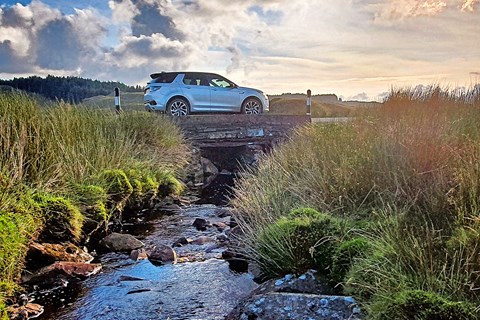
It's been great to be out and about in the Disco again as the country has unlocked. As I've said before, it eats long journeys like the First Class cabin of a transatlantic jet.
That's not the only thing it gobbles up, though. The price of diesel has been climbing since the first lockdown last year and it seems my right foot has got heavier too, now I'm feeling 'liberated'. The best economy I've seen in the last 10 months was 32.0mpg; the worst was this month at 28.2mpg. My price per mile has rocketed from 16.7p last summer to 29.1p now.
Factor in that I got stung for AdBlue this month, and I'm starting to wonder if I shouldn't just 'Stay Home, Save Money'. The Sport is glugging 10 litres of 'diesel exhaust fluid' every 3500 miles, and this month I ran so low (ignoring the yellow warning messages) I eventually got a bright red 'Engine Starts No Longer Possible' alarm.
In other words, if I stopped the Discovery Sport it was going to refuse to re-start. So I pulled into our local Shell station and ended up paying £19.99 for 10 litres – double what I could have paid if I'd shopped around. Petrol stations are ruthless when it comes to preying on the weak and desperate. And the stupid.
By Mark Walton
Logbook: Land Rover Discovery Sport D240 HSE R-Dynamic
Price £50,635 (£60,120 as tested)
Performance 1999cc turbodiesel four-cylinder, 237bhp, 7.9sec 0-62mph, 137mph
Efficiency 36.6mpg (official), 28.2mpg (tested), 202g/km CO2
Energy cost 29.1p per mile
Miles this month 1225
Total miles 7737
Month 9 living with a Land Rover Discovery Sport: modern and proud
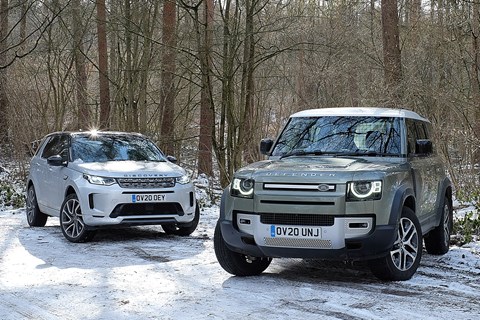
Parked next to a new Defender, our Discovery Sport looks like it was bullied at school; like an accountant meeting Bear Grylls.
Same price, same engine, same brand, but driving them back to back, the Defender feels like it's built for dreams of adventure – all very nice, but try parking it in a supermarket car park. It's huge and heavy and there's a lot of wind noise. The Disco, meanwhile, is built for the real world: it's comfortable, refined and more agile. I reckon the styling will age better too – is it me, or does the 'utility' Defender look like it's trying way too hard?
It's the less trendy car, but I'd choose the Disco Sport.
By Mark Walton
Logbook: Land Rover Discovery Sport D240 HSE R-Dynamic
Price £50,635 (£60,120 as tested)
Performance 1999cc turbodiesel four-cylinder, 237bhp, 7.9sec 0-62mph, 137mph
Efficiency 36.6mpg (official), 29.2mpg (tested), 202g/km CO2
Energy cost 21.3p per mile
Miles this month 676
Total miles 6512
Month 8 living with a Land Rover Discovery Sport: under the microscope
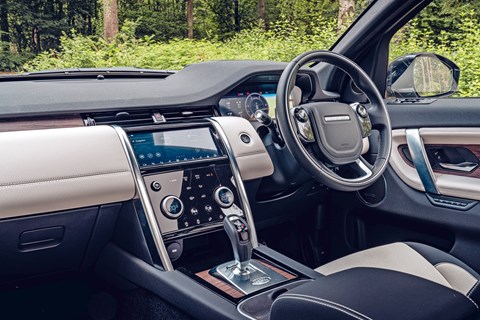
Eyes up
You can't see it, but our car is fitted with the head-up display, projecting speed and sat-nav instructions on the windscreen. Along with a wireless phone charger in the centre cubbyhole, it's part of the £605 Technology Pack option.
Need to know
Binnacle screen is configurable. I have it split: fuel on the left, map on the right, revcounter in the middle.
Wood picker
The 'Natural Shadow Oak veneer' inserts are a modern, classy highlight in the overall scheme. An £80 option that's worth it.
Still creamy
Facia and doors are trimmed with a diamond-dimpled surface that still looks good, despite my 21-year-old son putting his feet up before I have time to yell at him. Cream hasn't discoloured and wipes down well.
Fresh prints
Piano-black centre panel is permanently covered in smudges and fingerprints. Thankfully LR has stuck with proper rotary heater dials.
Bogus bonus
Not sure why our steering wheel has an extra chrome trim around the rim. I didn't deliberately choose it in the spec and I'm not a fan.
Leather or not
Non-leather 'Ebony and Oyster Luxtec and Suedecloth' is a no-cost option. Perforated cushion fabric wipes down well; the darker bolsters are a good approximation of hide.
By Mark Walton
Logbook: Land Rover Discovery Sport D240 HSE R-Dynamic
Price £50,635 (£60,120 as tested)
Performance 1999cc turbodiesel four-cylinder, 237bhp, 7.9sec 0-62mph, 137mph
Efficiency 36.6mpg (official), 29.4mpg (tested), 202g/km CO2
Energy cost 19.2p per mile
Miles this month 720
Total miles 5836
Month 7 living with a Discovery Sport: long winters please
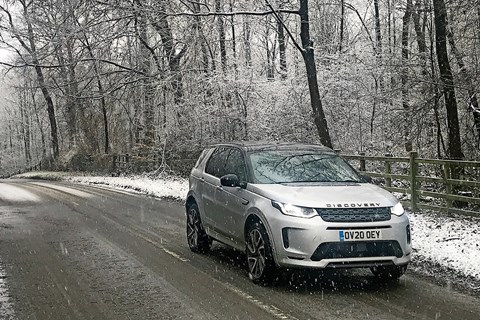
Winter. What a great season to be a Land Rover driver. While other cars crawl along, terrified of every sprinkle of snow, Land Rover owners revel in that unstoppable 4x4 feeling.
New Mk2 Discovery Sports use the latest Active Driveline four-wheel-drive system developed by GKN, after years of Freelanders and Disco Sports using Haldex units. Active Driveline can turn off the rear axle completely and make the car front-wheel drive if you're cruising along the motorway, improving fuel consumption; but when it detects slip, it can send torque to the rear wheels (within 300 milliseconds). Two multi-plate clutches in the rear axle allow drive to reach the rear wheels independently, which can be used for torque vectoring to improve turn-in on the road; or in the snow it can feed torque to whichever wheel has most traction. All supplemented by Terrain Response 2, which monitors suspension, powertrain and wheel slip to dole out power where needed.
I don't want to sound reckless, but in the snow you can drive around like it's a wet day – the car doesn't squirm or slither, it just drives straight and true.
By Mark Walton
Logbook: Land Rover Discovery Sport D240 HSE R-Dynamic
Price £50,635 (£60,120 as tested)
Performance 1999cc turbodiesel four cylinder, 237bhp, 7.9sec 0-62mph, 137mph
Efficiency 36.6mpg (official), 30.3mpg (tested), 202g/km CO2
Energy cost 16.7p per mile
Miles this month 412
Total miles 5116
Month 6 living with a Discovery Sport: changing the climate
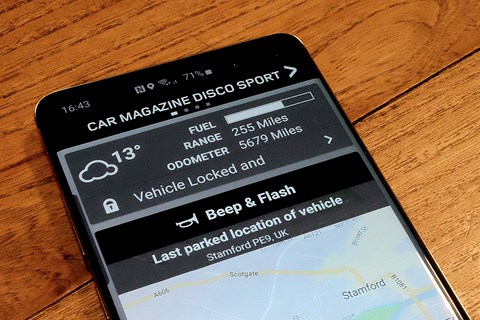
Lockdown means I haven't done many miles in the Discovery Sport this month; it's been parked up looking a bit downcast and ignored. Still, being stuck at home means I had the chance to check out a hitherto unexplored dimension of Disco ownership, the Land Rover Remote app.
After linking your car to your InControl account using the VIN number, the app allows you to check the car's location, its fuel range, to see if it's locked and alarmed, and the status of things like tyre pressures and AdBlue levels. You can also download your journey history, including your route and mileage statistics, which you can then export in Excel format, which is handy for claiming expenses.
Best of all, though, is the ability to start the engine and set the cabin temperature. This is a slightly freaky thing to do, especially if like us you don't have a drive, and the car is parked up on the street round the corner. The first time I tried it, I had to go out and check the car – there it was in the dark, locked and lights off, but with the engine running and the heating on. I know none of this technology is brand new but it still felt like I had magical powers.
By Mark Walton
Logbook: Land Rover Discovery Sport D240 HSE R-Dynamic
Price £50,635 (£60,120 as tested)
Performance 1999cc turbodiesel four-cylinder, 237bhp, 7.9sec 0-62mph, 137mph
Efficiency 36.6mpg (official), 30.1mpg (tested), 202g/km CO2
Energy cost 17.2p per mile
Miles this month 359
Total miles 4704
Month 5 living with a Discovery Sport: racking it up
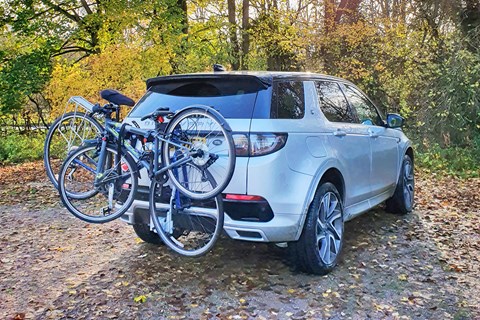
After last month’s green laning I started imagining our next adventure: tackling the Makgadikgadi salt flats in Botswana, perhaps? In the end, we went for a bike ride near Corby.
Land Rover offers a couple of bike-carriers as options: fit the £303 roof bars and you can attach a single-bike carrier on top for £149; or there’s a two-bike ball-hitch rack for £599 and a three-bike for £719. Our car has the £1035 towbar.
However, I’m a skinflint and I paid £100 for this Thule HangOn carrier, which is sturdy, easy to attach plus the colour matches our silver Disco Sport exactly. Nice!
By Mark Walton
Logbook: Land Rover Discovery Sport D240 HSE R-Dynamic
Price £50,635 (£60,120 as tested)
Performance 1999cc turbodiesel four-cylinder, 237bhp, 7.9sec 0-62mph, 137mph
Efficiency 36.6mpg (official), 29.4mpg (tested), 202g/km CO2
Energy cost 18.1p per mile
Miles this month 766
Total miles 4345
Month 4 living with a Land Rover Discovery Sport: greenlaning with a Series 1
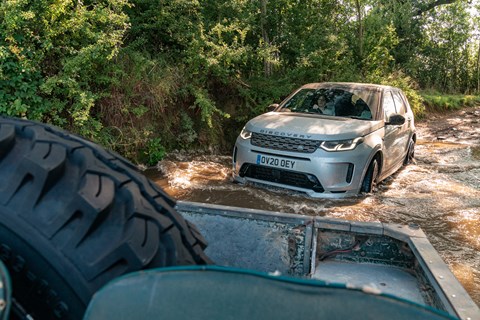
What's the appeal of off-roading? I have no idea. It feels instinctive, but my nomadic ancestors weren't exactly cruising round the savannah on 20-inch alloys, so I can't claim it's primeval. It feels liberating, so maybe it's to do with escaping modern life? Turning off that crowded main road, with its speed cameras and warning signs, to strike out across a field...
No, wait! NOT A FIELD! I didn't mean that. I'm NOT TRESPASSING.
Off-roading has become controversial. Unless you own a Scottish shooting estate, there aren't many places left in the UK to venture off tarmac. The last public tracks, open to the likes of you and me, are green lanes, and even those have come under fire recently. A high-profile case in the Lake District last year tried to shut down a couple of green lanes to 4x4s. The campaigners lost, but their cause was plastered all over the media.
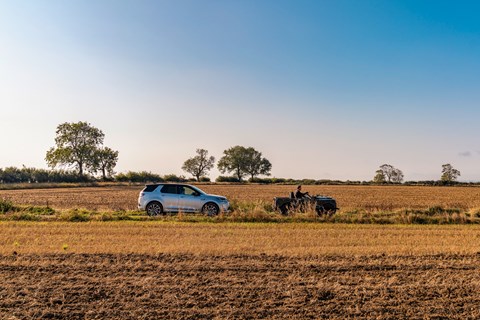
The 4x4 drivers realised their hobby was under threat a long time ago and they got organised. This year marks the 25th anniversary of the Green Lane Association, or GLASS. GLASS promotes responsible off-road driving and it spends most of its members' cash on restoring and maintaining green lanes. GLASS doesn't even like the term 'off-road'. 'Green lanes are unsurfaced public roads that were never tarmacked,' explains Lauren Eaton of GLASS. 'They retain the same status of any legal road in the country. If people think it's off-road, they immediately think the rules don't apply. But they do.'
Lauren's point is borne out by looking at old maps. One of the resources available when you join GLASS is Trailwise2, the organisation's online mapping tool that shows every green lane in the UK, along with notes and advice from other members. You can overlay the routes on the latest Ordnance Survey maps, but you can also choose historical maps, dating back to 1885. Sure enough, the green lanes were always there, often shown as roads.
After 120 years of tarmacking, most green lanes are very short these days. The campaign in the Lakes surrounded a 1.5-mile track in Little Langdale, and a 0.3-mile lane near Coniston. Which seems crazy to me – think of the traffic visiting the national park every year, millions of cars clogging the roads. If you're worried about the Lakes being ruined, all that angst about a few 4x4s on a 500-metre stretch of track seems a bit disproportionate.
Oh well, it's time for me to have a go. After joining GLASS and spending hours absorbed in Trailwise2, I find some lanes in nearby Leicestershire. Because the lanes are so short, you're really looking for a route that can link a series of gravel tracks together, with lots of narrow B-road in between. Strictly speaking it should be called 'back laning'.
It's a stunning day, and my wife Melissa joins us with our Series 1, roof down, windscreen folded. I've owned this car for two years and I love it. It's an early 80-inch, exported to Australia in 1950. When its working life ended it was parked in a barn, where it stayed for 35 years. It was then dragged out, stuck on eBay and bought by a Belgian collector, who shipped it back to Europe and mechanically restored it, keeping its 70-year-old patina. It eventually found its way home in stunningly original condition.
Compared to the Series 1, the Discovery Sport looks like a spaceship, and of course it can't compete on character – or interior ambience – on a day like today. Still, there's something about Land Rovers, old and new: they always look at home on a dirt road.
Even after triple-checking the map, there's something unnerving the first time you open a farmer's gate and drive into a field. I keep telling myself, 'It's a public road, a public road!' But I have no need to worry – we quickly come across a couple of dog walkers and then the farmer himself, in a tractor. I'm half expecting a showdown, but everyone just waves.
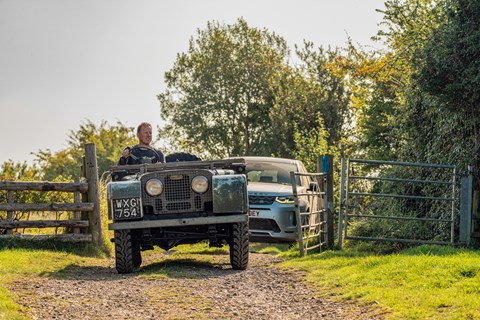
The tracks make their way across idyllic, undulating countryside, and we roll along at 10mph. Apart from some deep potholes, the lanes are hard-packed and smooth at this time of year, before winter gets going, posing no challenge at all to the crude all-wheel-drive of the Series 1 or the supercomputer 4x4 of the Disco. There are a couple of times when extra ground clearance would have been nice on the Discovery Sport, but with no air suspension option, raising the ride height isn't possible. Never mind, with a bit of careful maneouvreing we avoid scraping any plastic.
Much more fun are the fords, which definitely add a feeling of adventure. Again, I'm not sure which bit of my brain this is all appealing to, but I glow with satisfaction when I drive the Series 1 through the water. The Discovery just shrugs and follows, wondering what the fuss is about.
At these speeds and in these conditions, neither car feels stretched by these green lanes, but the instinctive pleasure is undeniable. Ironically, the chasm in capability between them – that 70-year age difference – is mostly felt when we turn back on the tarmac. My wife takes the Discovery and is home in 30 minutes; meanwhile the Series 1 grinds home at 40mph and by the time I get back I'm almost deaf from wind noise.
We recommend joining GLASS (glass-uk.org) before green laning
By Mark Walton
Logbook: Land Rover Discovery Sport D240 HSE R-Dynamic
Price £50,635 (£60,120 as tested)
Performance 1999cc turbodiesel four-cylinder, 237bhp, 7.9sec 0-62mph, 137mph
Efficiency 36.6mpg (official), 29.5mpg (tested), 202g/km CO2
Energy cost 21.6p per mile
Miles this month 1187
Total miles 3579
Month 3 living with a Land Rover Discovery Sport: Rangie anxiety
Three months in, and our Disco Sport's ace card is clear: this is an incredibly comfortable and capable cruiser, a car that makes longer journeys about as pleasurable as they ever could be. (We're talking in relative terms here, like saying that Terminal 5 is a nice airport.)
The D240 engine is almost silent at motorway speeds, wind noise is low, the ride is relaxed and the seats are incredibly supportive and comfortable, especially with our optional, non-leather fabric. Instead of perching on stiff leather, I feel like I'm being gently hugged by a favourite armchair.
I'm also appreciating the driving position. It's not just the height – the Sport is really no taller than many other SUVs – instead, it's the relationship between seat, steering wheel, the top of the dashboard and the view down the bonnet. Climbing out of the Disco and into our faithful old Subaru Forester, it feels like I've moved from the armchair to a beanbag on the floor.
My only issue is the Land Rover badge on the back. This new Disco feels like a Range Rover, it looks like a Range Rover and it's priced a lot like a Range Rover too. Though we're talking in relative terms again: when I say 'issue' I don't care that much.
By Mark Walton
**Logbook: Land Rover Discovery Sport D240 HSE R-Dynamic
Price £50,635 (£60,120 as tested)
Performance 1999cc turbodiesel four-cylinder, 237bhp, 7.9sec 0-62mph, 137mph
Efficiency 36.6mpg (official), 29.5mpg (tested), 202g/km CO2
Energy cost 21.6p
Miles this month 773
Total miles 2392
Month 2 living with a Land Rover Discovery Sport: this or a new Defender?
The new Defender is enjoying its moment in the sun right now, and barely anyone in the UK is interested in the (still new-ish) Discovery Sport Mk2. I’m surprised you’re even reading this.
But a recent drive of the Defender on the much-delayed UK launch helped highlight some of the strengths of the smaller Disco.
First of all, I was surprised how strained the 2.0-litre D240 engine felt in the Defender. It’s not terrible, but after the Discovery Sport, the 2.3-tonne 110 felt like it was making the turbodiesel work. Driving home in the lighter Discovery Sport, the same D240 engine felt perkier, quieter, more refined.
Same with the wind noise: at motorway speeds the wind starts to whoosh around the Defender’s more upright screen and A pillars. The Disco Sport just glides along.
Still, I liked the Defender. I liked how beefy it felt; I couldn’t believe how small our Discovery Sport seemed after driving it. The 110 is 24cm taller and 42cm longer (if you include the spare wheel), and inside the Defender you can wave your arms and legs around like you’re doing the hokey-cokey, there’s so much head- and legroom. Climbing back into the Discovery Sport, it felt so compact and low to the ground – more like a regular car than an SUV. On balance, a more refined car to drive, with better body control and sweeter handling; but also more ordinary than the big, bold Defender.
This matters, because our D240 Disco Sport HSE cost £60k by the time we’d added options; the Defender 110 with the same engine is also £60k in HSE spec – albeit before options, but the standard equipment list isn’t shabby.
So which should you choose? Depends how you’ll use it: I’d say the Discovery Sport is more car-like, more comfortable and better on longer journeys; the Defender can do everything the Disco Sport can, but it feels big and blunt – a workhorse rather than an executive SUV.
By Mark Walton
Logbook: Land Rover Discovery Sport D240 HSE R-Dynamic
Price £50,635 (£60,120 as tested)
Performance 1999cc turbodiesel four-cylinder, 237bhp, 7.9sec 0-62mph, 137mph
Efficiency 36.6mpg (official), 29.5mpg (tested), 202g/km CO2
Energy cost 21.8p
Miles this month 635
Total miles 1619
Month 1 of our Land Rover Discovery Sport long-term test: the introduction
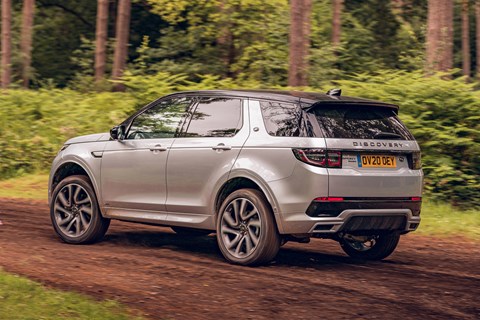
Poor Disco Sport: totally drowned out by all the coverage and James Bond hype surrounding the new Defender. Which is a shame, because the Sport deserves a bit of attention. Since the MkII was launched last year, it's a much improved family SUV – and yes, I'd say it is a MkII, because the changes were much deeper than a mere facelift.
As well as the restyled exterior and interior, under the skin it got a revised front end using the new Premium Transverse Architecture subframe (also found in the second-gen Range Rover Evoque). That means mild-hybrid 48-volt electrics and a PHEV; it's also transformed the ride and cabin refinement.
This much we know from the car's launch; now we'll find out what it's like to live with, day to day.
The Disco Sport configurator has a fork in the road at the very first step: there's the Standard car, which gives Land Rover its £31,905 entry price; and the R-Dynamic, which immediately adds a £10k premium. That base price means the weakest diesel engine (the D150), a manual 'box and 17-inch alloys – the kind of bare-minimum farmer spec that rarely gets ordered in 2020.
Our car is an R-Dynamic, which upgrades you to 18-inch wheels minimum, an auto 'box, different bumpers, body-coloured arches and lots of extra interior trim details. Of the three diesels and two petrol engines available – all 2.0-litre Ingenium four-cylinders – we've gone for the most powerful diesel, the D240, which means 237bhp and 369lb ft.
Then you pick from three trim levels: S, SE or HSE. Our HSE gets (among other things, on a gigantic standard equipment list): 20-inch alloys; 'premium' LED headlights; a Meridian sound system; plus lots of extra convenience features, like a powered tailgate, keyless entry, and a rear-view mirror that can turn into a rear-facing video screen.
We're now at just over £50k, before you start adding options.
Yes, okay, I concede: our car is silver (Indus Silver, £705), which you might say is boring; but whenever I see Disco Sports on the road, old or new, I think darker colours make it look too heavy and slab-sided.
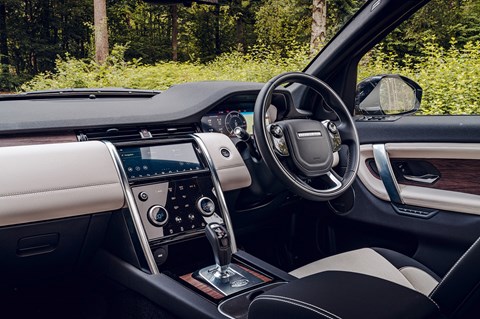
Combined with the black contrast roof (£610) silver emphasises the swept-back glass-house and that dynamic, angled C-pillar. Add optional 21-inch alloys (£780), and I reckon our Sport looks absolutely awesome.
Inside, the biggest decision is five seats or seven. A warning to anyone who's ordering a car: the button to choose between five seats and the third-row option seems kind of hidden under the seat-fabric options in the configurator. Which I think is weird, given the seating layout is such a big part of the Discovery Sport's appeal.
Anyway, in the end I went for five seats, which means a slightly bigger boot and allows for the full-size spare option (though adding that wheel in the boot costs a steep £875).
Inside I've gone for the non-leather, Light Oyster/Ebony Luxtec and suedecloth seats, a no-cost option. I love it, but everyone who's seen the car so far takes one look and winces at all those creamy white surfaces. How they'll fare in a family off-roader, time will tell. Marmite sandwich, anyone?
Add in the Natural Shadow Oak veneer panels (£80) and the fixed panoramic roof (£1120) and it's a really light, modern, Scandi-style interior. I love it.
In the end, our Disco Sport comes in at £60,120, which puts it into Discovery and Velar territory. It's also, funnily enough, the same price as the new Defender 110 First Edition. Our new Disco Sport has six months to carve out a distinctive place for itself.
By Mark Walton
Logbook: Land Rover Discovery Sport D240 HSE R-Dynamic
Price £50,635 (£60,120 as tested)
Performance 1999cc turbodiesel four-cyl, 237bhp, 7.9sec 0-62mph, 137mph
Efficiency 36.6mpg (official), 32.5mpg (tested), 202g/km CO2
Energy cost TBC
Miles this month 324
Total miles 984